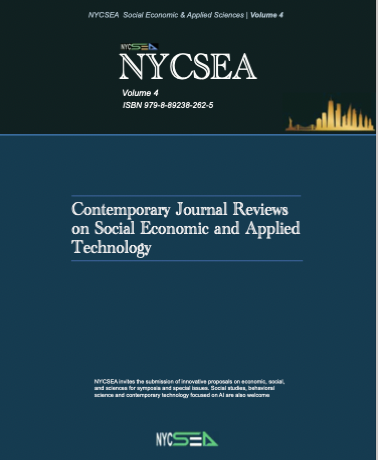We congratulate you on acceptance of your manuscript.

Abstract: Pathogens that can develop resistance to antimicrobial treatments have become a phenomenon extensively recorded over the last few years. Pathogens, including Escherichia coli, are dangerous to humans and are capable of resisting various therapies. Treatments using clove (Syzygium aromaticum) essential oil and eugenol extracted from clove buds have been shown to deactivate Escherichia coli strains and to prevent the development of antimicrobial resistance. As pathogens such as Escherichia coli have become a concern in the medical world, it is crucial to attempt to find the most effective treatment; comparing the performance of these two treatments would be beneficial in finding this. Clove oil and eugenol samples were applied to antibiotic disks and placed in agar plates inoculated with Escherichia coli. Plates with ampicillin and no treatment were prepared as well. These plates were stored in an incubator and taken out three days each. The areas of the zones of inhibition were recorded, and their averages were calculated; visual observations were written down as well. The eugenol plate demonstrated dense Escherichia coli growth and minor zones of inhibition, while the essential oil plate featured sparse growth. This could suggest that clove essential oil can more inhibit Escherichia coli growth, though it was theorized that the oil may have been thin enough to diffuse across its plate.
References
[1] Calderón, D., Cárdenas, P. A., Prado-Vivar, B., Graham, J. P., & Trueba, G. (2022). A longitudinal study of dominant E. coli lineages and antimicrobial resistance in the gut of children living in an upper middle-income country. Escholarship.org, 29. https://doi.org/10.1016/j.jgar.2022.03.002
[2] Crettels, L., Champon, L., Burlion, N., Delrée, E., Saegerman, C., & Thiry, D. (2023). Antimicrobial resistant Escherichia coli prevalence in freshwaters in Belgium and human exposure risk assessment. Heliyon, 9(6), e16538. https://doi.org/10.1016/j.heliyon.2023.e16538
[3] Jeyakumar, G. E., & Lawrence, R. (2020). Mechanisms of bactericidal action of Eugenol against Escherichia coli. Journal of Herbal Medicine, 26, 100406. https://doi.org/10.1016/j.hermed.2020.100406
[4] Lambert, M. M., Campos, D. R., Borges, D. A., de Avelar, B. R., Ferreira, T. P., Cid, Y. P., Boylan, F., Scott, F. B., de Almeida Chaves, D. S., & Coumendouros, K. (2020). Activity of Syzygium aromaticum essential oil and its main constituent eugenol in the inhibition of the development of Ctenocephalides felis felis and the control of adults. Veterinary Parasitology, 282, 109126.
https://doi.org/10.1016/j.vetpar.2020.109126
[5] Nakano, R., Nakano, A., Nishisouzu, R., Hikosaka, K., Suzuki, Y., Kamoshida, G., Tansho-Nagakawa, S., Endo, S., Kasahara, K., Ono, Y., & Yano, H. (2023). Genetic relatedness of third-generation cephalosporin-resistant Escherichia coli among livestock, farmers, and patients in Japan. One Health, 16(16), 100524–100524. https://doi.org/10.1016/j.onehlt.2023.100524
[6] Peña-Gonzalez, A., Soto-Giron, M. J., Smith, S., Sistrunk, J. R., Montero, L., Páez, M., Ortega, E., Hatt, J. K., Cevallos, W., Trueba, G., Levy, K., & Konstantinidis, K. T. (2019). Metagenomic Signatures of Gut Infections Caused by Different Escherichia coli Pathotypes. ASM Journals, 85(24).
https://doi.org/10.1128/aem.01820-19
[7] Tan, M.-F., Li, H.-Q., Yang, Q., Zhang, F.-F., Tan, J., Zeng, Y.-B., Wei, Q.-P., Huang, J.-N., Wu, C.-C., Li, N., & Kang, Z.-F. (2023). Prevalence and antimicrobial resistance profile of bacterial pathogens isolated from poultry in Jiangxi Province, China from 2020 to 2022. Poultry Science, 102(8), 102830.
https://doi.org/10.1016/j.psj.2023.102830
[8] Wongsawan, K., Chaisri, W., Tangtrongsup, S., & Mektrirat, R. (2019). Bactericidal Effect of Clove Oil against Multidrug-Resistant Streptococcus suis Isolated from Human Patients and Slaughtered Pigs. Pathogens, 9(1), 14.
https://doi.org/10.3390/pathogens9010014
[9] Yoo, J. H., Baek, K. H., Heo, Y. S., Yong, H. I., & Jo, C. (2020). Synergistic bactericidal effect of clove oil and encapsulated atmospheric pressure plasma against Escherichia coli O157:H7 and Staphylococcus aureus and its mechanism of action. Food Microbiology, 93, 103611.
https://doi.org/10.1016/j.fm.2020.103611
[10] Zhang, Y., Wang, Y., Zhu, X., Cao, P., Wei, S., & Lu, Y. (2017). Antibacterial and antibiofilm activities of eugenol from essential oil of Syzygium aromaticum (L.) Merr. & L. M. Perry (clove) leaf against periodontal pathogen Porphyromonas gingivalis. Microbial Pathogenesis, 113, 396–402.
https://doi.org/10.1016/j.micpath.2017.10.054